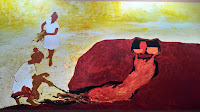 6,000 years ago people hunted, fished, grew crops, baked
pottery, loved and died on this exact spot.
Exploring this site by myself today I realized that not much has
changed. We still don't know who we
really are are why we're here.
6,000 years ago people hunted, fished, grew crops, baked
pottery, loved and died on this exact spot.
Exploring this site by myself today I realized that not much has
changed. We still don't know who we
really are are why we're here.  There is an experiment where the scientist records the
moment when a decision to move the wrist is made in the brain. Then the moment of the actual movement is
recorded. That's quite straight forward, it takes time before the thought
results in a movement. However, the EEG
was able to detect that the specific brain activity took place BEFORE the
person thought they made the decision.
We think we have conscious free will, but at the time when we thought we
made a decision to move.... the decision had already been made!
There is an experiment where the scientist records the
moment when a decision to move the wrist is made in the brain. Then the moment of the actual movement is
recorded. That's quite straight forward, it takes time before the thought
results in a movement. However, the EEG
was able to detect that the specific brain activity took place BEFORE the
person thought they made the decision.
We think we have conscious free will, but at the time when we thought we
made a decision to move.... the decision had already been made! What has this to do
with the primitive village? The
primitive village is simpler - you can see how there lives are intimately
enmeshed in their environment. I believe
it is the primary conundrum of human existence.
We desperately want to consider ourselves as free individuals. Yet if everything we think and do is
dependent on patterns that have already taken place then who we think we are is
actually a very complicated mixture of predetermined flows. Therefore, the idea of an 'I' who is steering
the ship is only an illusion! The
beautifully formed bowl, the image of a face, the fishhooks for ears all arise
from earlier causes.
What has this to do
with the primitive village? The
primitive village is simpler - you can see how there lives are intimately
enmeshed in their environment. I believe
it is the primary conundrum of human existence.
We desperately want to consider ourselves as free individuals. Yet if everything we think and do is
dependent on patterns that have already taken place then who we think we are is
actually a very complicated mixture of predetermined flows. Therefore, the idea of an 'I' who is steering
the ship is only an illusion! The
beautifully formed bowl, the image of a face, the fishhooks for ears all arise
from earlier causes.
So what I am
wondering is....if each choice was already made because of a complicated
network of causes....maybe the life force that animated the primitive village
is no different from the life force which surrounds it today in the form of
enormous concrete apartment towers. I
would be tempted to say, "We are still here." Except that my
theory/realization blows the pronoun 'we' right out of the water.
 Descartes' statement:
"I think, therefore I am."
takes on new meaning if we care to wonder who we are if thinking becomes
still.
Descartes' statement:
"I think, therefore I am."
takes on new meaning if we care to wonder who we are if thinking becomes
still.
On my days off I am experimenting with awareness of the
breath. Even though it's sometimes hard to keep the mind on the breath, I
notice it's always possible to attend to a single breath. The mind wants very much to escape and think
about something more interesting; however, if it always is just one breath the
task never changes and never becomes more difficult. Practicing this made me aware of the enormous
resistance - a resistance, moreover, that is wholly incapable of justifying
itself. "Why keep running
around?" I ask the mind. It has no excuse. "Why not be still for
an hour?" The mind goes into a
panic and rebels. I'm wondering if the
reason for this panic is that it comes from an illusory entity (a false self)
that is desperately trying to avoid exposure.
Now I am getting busy with my classes, trying to help Chinese people learn a language from a small island on the other side of the globe that happens to have spread itself world wide. I know I am part of an unfolding that goes so far beyond me in time and space. Did neolithic times contain the seeds of all we are today?










